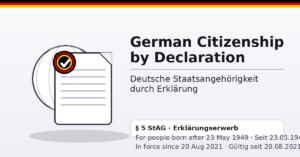Federal Administrative Court, 10.12.2013, Ref.: BVerwG 1 C 1.13
Until June 30, 2011, according to § 31 (1) Sentence 1 No. 1 of the Residence Act (AufenthG), the marriage between a foreign national and a German citizen had to have lasted at least two years before the foreign national could apply for an independent right of residence under § 31 AufenthG after the dissolution of the marital cohabitation.
On July 1, 2011, this minimum duration was increased from two years to three years. The main objective of this legislative amendment was, according to the legislator, to combat forced marriages.
However, legal uncertainty arose whenever a foreign national fulfilled the requirements for an independent right of residence under the old law but applied for such a right only after the new regulation came into effect on July 1, 2011.
The Federal Administrative Court had to decide on such a case in the ruling mentioned above.
Introduction – Syrian Citizen Entered for Studies
This case concerns a Syrian citizen who travelled to Germany in 2000 for the purpose of studying. After completing his education and the associated residence permit, he received a residence permit for the purpose of living in Germany due to his marriage to a German national. Family reunification. When the marriage broke down, he applied for an independent residence permit, but this was rejected. This case led to a legal dispute that ultimately ended before the Federal Administrative Court.
Initial Situation – Married a German Citizen During His Studies
The plaintiff entered Germany in 2000 on a student visa. The residence permit issued for his studies was regularly extended, most recently until March 2009. On March 4, 2009, he married a German citizen and was subsequently granted a residence permit for family reunification, valid until May 12, 2012.
Separation and Application for an Independent Residence Permit
In May 2011, the couple separated. A few months later, in September 2011, the plaintiff applied for an independent residence permit, independent of the continuation of the marriage. However, the competent immigration authority rejected this application, arguing that the marital cohabitation had lasted less than three years. According to the law in effect from July 1, 2011, the marriage had to have lasted at least three years to justify an independent right of residence. The previous regulation, which required only two years, was no longer applicable to the plaintiff’s case.
Decision of the Administrative Court
The plaintiff then filed a lawsuit with the Administrative Court, which confirmed the immigration authority’s decision. The Administrative Court also denied the plaintiff an independent right of residence, citing the amended legal situation. According to the court, the version of the Residence Act in effect at the time of the application was decisive, which required the marital cohabitation to have lasted three years.
Decision of the Federal Administrative Court
The plaintiff appealed this decision to the Federal Administrative Court. However, the Federal Administrative Court also agreed with the legal interpretation of the Administrative Court. According to § 31 (1) AufenthG, a foreign national who has lived in marital cohabitation in Germany can obtain an independent residence permit for one year if the marriage has lasted at least three years. This requirement, under the version effective since July 1, 2011, was not met, as the plaintiff’s marriage had lasted only slightly more than two years.
Legal Assessment
The Federal Administrative Court argued that the law did not provide for a transitional provision for old cases. The entitlement to an independent residence permit does not arise automatically upon the end of the marriage but only upon application. Since the plaintiff filed his application after the stricter regulation had come into effect, it was applicable. The court did not see any constitutional concerns, particularly regarding the prohibition of retroactivity and the protection of legitimate expectations. It also referred to the hardship clause in § 31 (2) AufenthG, which, however, did not apply in this case.
Conclusion
This case highlights the importance of the temporal applicability of legal changes in residence law. The Federal Administrative Court clarified that the legal situation at the time of the application is decisive for the decision on an independent residence permit. The plaintiff could not rely on the old, more favorable version of the law, as it was no longer in force at the time of his application.
Source: Federal Administrative Court
Important Note: The content of this article has been prepared to the best of our knowledge and belief. However, due to the complexity and constant evolution of the subject matter, we must exclude liability and warranty. Important Notice: The content of this article has been created to the best of our knowledge and understanding. However, due to the complexity and constant changes in the subject matter, we must exclude any liability and warranty.
If you need legal advice, feel free to call us at 0221 – 80187670 or email us at info@mth-partner.de.
Lawyers in Cologne advise and represent you in immigration law.




